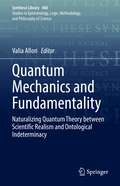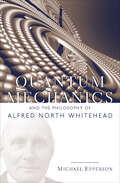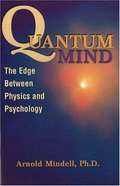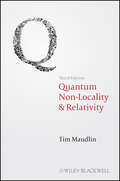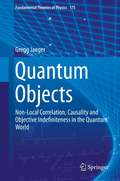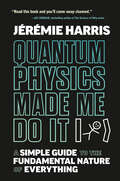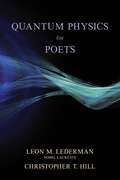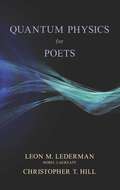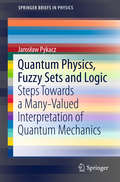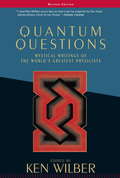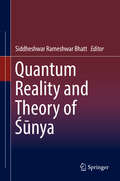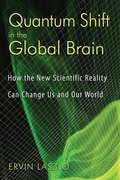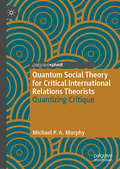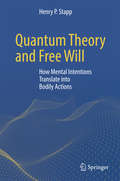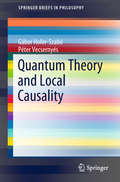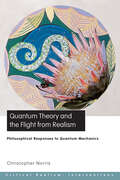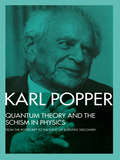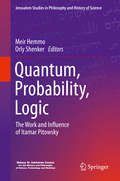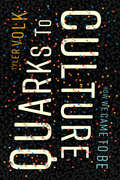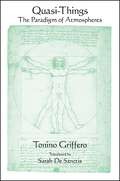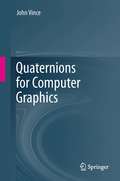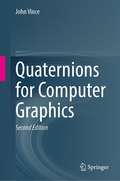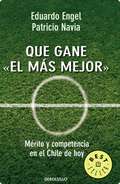- Table View
- List View
Quantum Mechanics and Fundamentality: Naturalizing Quantum Theory between Scientific Realism and Ontological Indeterminacy (Synthese Library #460)
by Valia AlloriThis edited collection provides new perspectives on some metaphysical questions arising in quantum mechanics. These questions have been long-standing and are of continued interest to researchers and graduate students working in physics, philosophy of physics, and metaphysics. It features contributions from a diverse set of researchers, ranging from senior scholars to junior academics, working in varied fields, from physics to philosophy of physics and metaphysics. The contributors reflect on issues about fundamentality (is quantum theory fundamental? If so, what is its fundamental ontology?), ontological dependence (how do ordinary objects exist even if they are not fundamental?), realism (what kind of realism is compatible with quantum theory?), indeterminacy (can the world itself exhibit ontological indeterminacy?). The book contains contributions from both physicists (including Nobel Prize winner Gerard 't Hooft), science communicators and philosophers.
Quantum Mechanics and the Philosophy of Alfred North Whitehead: And the Philosophy of Alfred North Whitehead (American Philosophy)
by Michael EppersonIn Process and Reality and other works, Alfred North Whitehead struggled to come to terms with the impact the new science of quantum mechanics would have on metaphysics.This ambitious book is the first extended analysis of the intricate relationships between relativity theory, quantum mechanics, and Whitehead's cosmology. Michael Epperson illuminates the intersection of science and philosophy in Whitehead's work-and details Whitehead's attempts to fashion an ontology coherent with quantum anomalies.Including a nonspecialist introduction to quantum mechanics, Epperson adds an essential new dimension to our understanding of Whitehead-and of the constantly enriching encounter between science and philosophy in our century.
Quantum Mind and Social Science
by Alexander WendtThere is an underlying assumption in the social sciences that consciousness and social life are ultimately classical physical/material phenomena. In this ground-breaking book, Alexander Wendt challenges this assumption by proposing that consciousness is, in fact, a macroscopic quantum mechanical phenomenon. In the first half of the book, Wendt justifies the insertion of quantum theory into social scientific debates, introduces social scientists to quantum theory and the philosophical controversy about its interpretation, and then defends the quantum consciousness hypothesis against the orthodox, classical approach to the mind-body problem. In the second half, he develops the implications of this metaphysical perspective for the nature of language and the agent-structure problem in social ontology. Wendt's argument is a revolutionary development which raises fundamental questions about the nature of social life and the work of those who study it.
Quantum Mind: The Edge Between Physics and Psychology
by Arnold MindellBy exploring principles found in psychology, math, physics, and shamanism, it becomes possible to link a cosmic perspective with ordinary life.
Quantum Non-Locality and Relativity: Metaphysical Intimations of Modern Physics (Aristotelian Society Monographs #1)
by Tim MaudlinThe third edition of Quantum Non-Locality and Relativity has been carefully updated to reflect significant developments, including a new chapter covering important recent work in the foundations of physics. A new edition of the premier philosophical study of Bell’s Theorem and its implication for the relativistic account of space and time Discusses Roderich Tumiulka’s explicit, relativistic theory that can reproduce the quantum mechanical violation of Bell’s inequality. Discusses the "Free Will Theorem" of John Conway and Simon Kochen Introduces philosophers to the relevant physics and demonstrates how philosophical analysis can help inform physics
Quantum Objects: Non-Local Correlation, Causality and Objective Indefiniteness in the Quantum World
by Gregg JaegerThis monograph identifies the essential characteristics of the objects described by current quantum theory and considers their relationship to space-time. In the process, it explicates the senses in which quantum objects may be consistently considered to have parts of which they may be composed or into which they may be decomposed. The book also demonstrates the degree to which reduction is possible in quantum mechanics, showing it to be related to the objective indefiniteness of quantum properties and the strong non-local correlations that can occur between the physical quantities of quantum subsystems. Careful attention is paid to the relationships among such property correlations, physical causation, probability, and symmetry in quantum theory. In this way, the text identifies and clarifies the conceptual grounds underlying the unique nature of many quantum phenomena.
Quantum Physics Made Me Do It: A Simple Guide to the Fundamental Nature of Everything
by Jeremie HarrisAn entertaining and accessible dive into the riveting world described by quantum mechanics, from physicist, AI risk expert, and Hollywood &“alternative reality&” consultant Jérémie Harris.Are human beings immortal? Are apples conscious? Do our legal systems make assumptions about free will that are just plain wrong? Of all the terrific books on quantum physics—from Stephen Hawking to Brian Greene—the questions they never seem to satisfy are the implications of the science. We know that quantum physics is real—our phones and computers wouldn&’t work if the science wasn&’t right. But what does it all mean?Does it mean that we live in one among a near-infinity of parallel universes? Or that everything that happens in the universe is pre-ordained—right down to what we think and how we act? Or does the science point in a stranger direction—towards the idea that the entire universe is one big mind? If one of these is true, what would it mean for our place in the universe, our immortal souls, and the future of humanity itself?The most basic encounter with quantum physics leads us to a dizzying array of incredible implications, each one more capable than the last of blowing our minds—all of which can be engaged without advanced math or deep knowledge of theory.Enter: Quantum Physics Made Me Do It—a smart, accessible, and engaging adventure through the complex and beautiful world mapped out by modern physics. Jérémie Harris at last offers us a book on quantum physics that the entire universe can enjoy—perhaps together as one big mind.
Quantum Physics for Poets
by Christopher T. Hill Leon M. LedermanQuantum theory is the bedrock of contemporary physics and the basis of understanding matter in its tiniest dimensions and the vast universe as a whole. But for many, the theory remains an impenetrable enigma. Now, two physicists seek to remedy this situation by both drawing on their scientific expertise and their talent for communicating science to the general reader. In this lucid, informative book, designed for the curious, Lederman and Hill make the seemingly daunting subject of quantum physics accessible, appealing, and exciting. Their story is partly historical, covering the many "Eureka" moments when great scientists-Max Planck, Albert Einstein, Niels Bohr, Werner Heisenberg, Erwin Schrödinger, and others-struggled to come to grips with the bizarre realities that quantum research revealed. Although their findings were indisputably proven in experiments, they were so strange and counterintuitive that Einstein refused to accept quantum theory, despite its great success. The authors explain the many strange and even eerie aspects of quantum reality at the subatomic level, from "particles" that can be many places simultaneously and sometimes act more like waves, to the effect that a human can have on their movements by just observing them! Finally, the authors delve into quantum physics' latest and perhaps most breathtaking offshoots-field theory and string theory. The intricacies and ramifications of these two theories will give the reader much to ponder. In addition, the authors describe the diverse applications of quantum theory in its almost countless forms of modern technology throughout the world. Using eloquent analogies and illustrative examples, Quantum Physics for Poets renders even the most profound reaches of quantum theory understandable and something for us all to savor.
Quantum Physics for Poets
by Leon M. LedermanQuantum theory is the bedrock of contemporary physics and the basis of understanding matter in its tiniest dimensions and the vast universe as a whole. But for many, the theory remains an impenetrable enigma. Now, two physicists seek to remedy this situation by both drawing on their scientific expertise and their talent for communicating science to the general reader. In this lucid, informative book, designed for the curious, Lederman and Hill make the seemingly daunting subject of quantum physics accessible, appealing, and exciting. Their story is partly historical, covering the many "Eureka" moments when great scientists-Max Planck, Albert Einstein, Niels Bohr, Werner Heisenberg, Erwin Schrödinger, and others-struggled to come to grips with the bizarre realities that quantum research revealed. Although their findings were indisputably proven in experiments, they were so strange and counterintuitive that Einstein refused to accept quantum theory, despite its great success. The authors explain the many strange and even eerie aspects of quantum reality at the subatomic level, from "particles" that can be many places simultaneously and sometimes act more like waves, to the effect that a human can have on their movements by just observing them! Finally, the authors delve into quantum physics' latest and perhaps most breathtaking offshoots-field theory and string theory. The intricacies and ramifications of these two theories will give the reader much to ponder. In addition, the authors describe the diverse applications of quantum theory in its almost countless forms of modern technology throughout the world. Using eloquent analogies and illustrative examples, Quantum Physics for Poets renders even the most profound reaches of quantum theory understandable and something for us all to savor.
Quantum Physics, Fuzzy Sets and Logic
by Jarosław PykaczThis Brief presents steps towards elaborating a new interpretation of quantum mechanics based on a specific version of Łukasiewicz infinite-valued logic. It begins with a short survey of main interpretations of quantum mechanics already proposed, as well as various models of many-valued logics and previous attempts to apply them for the description of quantum phenomena. The prospective many-valued interpretation of quantum mechanics is soundly based on a theorem concerning the isomorphic representation of Birkhoff-von Neumann quantum logic in the form of a special Łukasiewicz infinite-valued logic endowed with partially defined conjunctions and disjunctions.
Quantum Questions: Mystical Writings of the World's Great Physicists
by Ken WilberHere is a collection of writings that bridges the gap between science and religion. Quantum Questions collects the mystical writings of each of the major physicists involved in the discovery of quantum physics and relativity, including Albert Einstein, Werner Heisenberg, and Max Planck. The selections are written in nontechnical language and will be of interest to scientists and nonscientists alike.
Quantum Reality and Theory of Śūnya
by Siddheshwar Rameshwar BhattThe book deals with expounding the nature of Reality as it is understood in contemporary times in Quantum Physics. It also explains the classical Indian theory of Śūnya in its diverse facets. Thereafter it undertakes comparison between the two which is an area of great topical interest. It is a cross-disciplinary study by erudite Indian and western scholars between traditional Indian knowledge system and contemporary researches in Physical sciences. It points out how the theory of ‘Śūnyatā has many seminal ideas and theories in common with contemporary Quantum Physics. The learned authors have tried to dissolve the “mysteries” of Quantum Physics and resolved its “weird paradoxes” with the help of theory of Śūnyatā. The issue of non-separability or entanglement has been approached with the help of the Buddhist theory of Pratītyasamutpāda. The paradoxical situation of “wave-particle duality” has been explained with the help of Upaniṣadic theory of complementarity of the two opposites. The measurement problem represented by “Schrodinger’s cat” has been dealt with by resorting to two forms of the calculation of probabilities. Some writers have argued for Śūnyatā-like non-essentialist position to understand quantum reality. To make sense of quantum theory some papers provide a happy symbiosis of technical understanding and personal meditative experience by drawing multifarious parallels. This book will be of interest to philosophically inclined physicists and philosophers with interest in quantum mechanics.
Quantum Shift in the Global Brain: How the New Scientific Reality Can Change Us and Our World
by Ervin LaszloThe shift from scientific materialism to a multidimensional worldview in harmony with the world’s great spiritual traditions• Articulates humanity’s critical choice--to be the last decade of an outgoing, obsolete world, or the first of a new and viable one• Presents a new “reality map” to guide us through the environmental, scientific, and geopolitical upheavals we are experiencingOur world is in a Macroshift. The reality we are experiencing today is a substantially new reality--climate change, global corporations, industrialized agriculture--challenging us to change with our rapidly changing world, lest we perish. In this book, Ervin Laszlo presents a new “reality map” to guide us through the world shifts we are experiencing--the problems, opportunities, and challenges we face individually as well as collectively--in order to help us understand what we must do during this time of great transition. Science’s cutting edge now views reality as broader, as multiple universes arising in a possibly infinite meta-universe, as well as deeper, extending into dimensions at the subatomic level. Laszlo shows that aspects of human experience that had previously been consigned to the domain of intuition and speculation are now being explored with scientific rigor and urgency. There has been a shift in the materialistic scientific view of reality toward the multidimensional worldview of multiple interconnected realities long known by the world’s great spiritual traditions. By understanding the interconnectedness of our changing world as well as our changing “map” of the world, we can navigate with insight, wisdom, and confidence.
Quantum Social Science
by Emmanuel Haven Andrei KhrennikovWritten by world experts in the foundations of quantum mechanics and its applications to social science, this book shows how elementary quantum mechanical principles can be applied to decision-making paradoxes in psychology and used in modelling information in finance and economics. The book starts with a thorough overview of some of the salient differences between classical, statistical and quantum mechanics. It presents arguments on why quantum mechanics can be applied outside of physics and defines quantum social science. The issue of the existence of quantum probabilistic effects in psychology, economics and finance is addressed and basic questions and answers are provided. Aimed at researchers in economics and psychology, as well as physics, basic mathematical preliminaries and elementary concepts from quantum mechanics are defined in a self-contained way.
Quantum Social Theory for Critical International Relations Theorists: Quantizing Critique (Palgrave Studies in International Relations)
by Michael P. MurphyThis book examines the crossroads of quantum and critical approaches to International Relations and argues that these approaches share a common project of uncovering complexity and uncertainty. The “quantum turn” in International Relations theory has produced a number of interesting insights into the complex ways in which our assumptions about the physics of the world around us can limit our understanding of social life. While critique is possible within a Newtonian social science, core assumptions of separability and determinism of classical physics impose limits on what is imaginable. The author argues that by adopting a quantum imaginary, social theory can move beyond its Newtonian limits, and explore two methods for quantizing conceptual models—translation and application. This book is the first introductory book to quantum social theory ideas specifically intended for an audience of critical International Relations.
Quantum Theory and Free Will
by Henry P. StappThis book explains, in simple but accurate terms, how orthodox quantum mechanics works. The author, a distinguished theoretical physicist, shows how this theory, realistically interpreted, assigns an important role to our conscious free choices. Stapp claims that mainstream biology and neuroscience, despite nearly a century of quantum physics, still stick essentially to failed classical precepts in which mental intentions have no effect upon our bodily actions. He shows how quantum mechanics provides a rational basis for a better understanding of this connection, even allowing an explanation of certain phenomena currently held to be "paranormal". These ideas have major implications for our understanding of ourselves and our mental processes, and thus also for the meaningfulness of our lives.
Quantum Theory and Local Causality (SpringerBriefs in Philosophy)
by Gábor Hofer-Szabó Péter VecsernyésThis book summarizes the results of research the authors have pursued in the past years on the problem of implementing Bell's notion of local causality in local physical theories and relating it to other important concepts and principles in the foundations of physics such as the Common Cause Principle, Bell's inequalities, the EPR (Einstein-Podolsky-Rosen) scenario, and various other locality and causality concepts. The book is intended for philosophers of science with an interest in the formal background of sciences, philosophers of physics and physicists working in foundation of physics.
Quantum Theory and the Flight from Realism: Philosophical Responses to Quantum Mechanics (Critical Realism Ser.)
by Christopher NorrisThis book is a critical introduction to the long-standing debate concerning the conceptual foundations of quantum mechanics and the problems it has posed for physicists and philosophers from Einstein to the present. Quantum theory has been a major infulence on postmodernism, and presents significant problems for realists. Keeping his own realist position in check, Christopher Norris subjects a wide range of key opponents and supporters of realism to a high and equal level of scrutiny. With a characteristic combination of rigour and intellectual generosity, he draws out the merits and weaknesses from opposing arguments. In a sequence of closely argued chapters, Norris examines the premises of orthodox quantum theory, as developed most influentially by Bohr and Heisenberg, and its impact on varous philosophical developments. These include the ideas developed by W.V Quine, Thomas Kuhn, Michael Dummett, Bas van Fraassen, and Hilary Puttnam. In each case, Norris argues, these thinkers have been influenced by the orthodox construal of quantum mechanics as requiring drastic revision of principles which had hitherto defined the very nature of scientific method, causal explanati and rational enquiry. Putting the case for a realist approach which adheres to well-tried scientific principles of causal reasoning and inference to the best explanation, Christopher Norris clarifies these debates to a non-specialist readership and scholars of philosophy, science studies and the philosophy of science alike. Quantum Theory and the Flight From Realism suggests that philosophical reflection can contribute to a better understanding of these crucial, current issues.
Quantum Theory and the Schism in Physics: From the Postscript to The Logic of Scientific Discovery
by W. W. Bartley III Karl PopperQuantum Theory and the Schism in Physics is one of the three volumes of Karl Popper’s Postscript to the Logic of scientific Discovery. The Postscript is the culmination of Popper’s work in the philosophy of physics and a new famous attack on subjectivist approaches to philosophy of science. Quantum Theory and the Schism in Physics is the third volume of the Postscript. It may be read independently, but it also forms part of Popper’s interconnected argument in the Postscript. It presents Popper’s classic statement on quantum physics and offers important insights into his thinking on problems of method within science and physics as a whole.
Quantum, Probability, Logic: The Work and Influence of Itamar Pitowsky (Jerusalem Studies in Philosophy and History of Science)
by Meir Hemmo Orly ShenkerThis volume provides a broad perspective on the state of the art in the philosophy and conceptual foundations of quantum mechanics. Its essays take their starting point in the work and influence of Itamar Pitowsky, who has greatly influenced our understanding of what is characteristically non-classical about quantum probabilities and quantum logic, and this serves as a vantage point from which they reflect on key ongoing debates in the field. Readers will find a definitive and multi-faceted description of the major open questions in the foundations of quantum mechanics today, including: Is quantum mechanics a new theory of (contextual) probability? Should the quantum state be interpreted objectively or subjectively? How should probability be understood in the Everett interpretation of quantum mechanics? What are the limits of the physical implementation of computation? The impact of this volume goes beyond the exposition of Pitowsky’s influence: it provides a unique collection of essays by leading thinkers containing profound reflections on the field.Chapter 1. Classical logic, classical probability, and quantum mechanics (Samson Abramsky) Chapter 2. Why Scientific Realists Should Reject the Second Dogma of Quantum Mechanic (Valia Allori) Chapter 3. Unscrambling Subjective and Epistemic Probabilities (Guido Bacciagaluppi) Chapter 4. Wigner’s Friend as a Rational Agent (Veronika Baumann, Časlav Brukner) Chapter 5. Pitowsky's Epistemic Interpretation of Quantum Mechanics and the PBR Theorem (Yemima Ben-Menahem) Chapter 6. On the Mathematical Constitution and Explanation of Physical Facts (Joseph Berkovitz) Chapter 7. Everettian probabilities, the Deutsch-Wallace theorem and the Principal Principle (Harvey R. Brown, Gal Ben Porath) Chapter 8. ‘Two Dogmas’ Redu (Jeffrey Bub) Chapter 9. Physical Computability Theses (B. Jack Copeland, Oron Shagrir) Chapter 10. Agents in Healey’s Pragmatist Quantum Theory: A Comparison with Pitowsky’s Approach to Quantum Mechanics (Mauro Dorato) Chapter 11. Quantum Mechanics As a Theory of Observables and States and, Thereby, As a Theory of Probability (John Earman, Laura Ruetsche) Chapter 12. The Measurement Problem and two Dogmas about Quantum Mechanic (Laura Felline) Chapter 13. There Is More Than One Way to Skin a Cat: Quantum Information Principles In a Finite World(Amit Hagar) Chapter 14. Is Quantum Mechanics a New Theory of Probability? (Richard Healey) Chapter 15. Quantum Mechanics as a Theory of Probability (Meir Hemmo, Orly Shenker) Chapter 16. On the Three Types of Bell's Inequalities (Gábor Hofer-Szabó) Chapter 17. On the Descriptive Power of Probability Logic (Ehud Hrushovski) Chapter 18. The Argument against Quantum Computers (Gil Kalai) Chapter 19. Why a Relativistic Quantum Mechanical World Must be Indeterministic (Avi Levy, Meir Hemmo) Chapter 20. Subjectivists about Quantum Probabilities Should be Realists about Quantum States (Wayne C. Myrvold) Chapter 21. The Relativistic Einstein-Podolsky-Rosen Argument (Michael Redhead) Chapter 22. What price statistical independence? How Einstein missed the photon.(Simon Saunders) Chapter 23. How (Maximally) Contextual is Quantum Mechanics? (Andrew W. Simmons) Chapter 24. Roots and (Re)Sources of Value (In)Definiteness Versus Contextuality (Karl Svozil) Chapter 25: Schrödinger’s Reaction to the EPR Paper (Jos Uffink) Chapter 26. Derivations of the Born Rule (Lev Vaidman) Chapter 27. Dynamical States and the Conventionality of (Non-) Classicality (Alexander Wilce).
Quarks to Culture: How We Came to Be
by Tyler VolkOur world is nested, both physically and socially, and at each level we find innovations that are necessary for the next. Consider: atoms combine to form molecules, molecules combine to form single-celled organisms; when people come together, they build societies. Physics has gone far in mapping the basic mechanics of the simplest things and the dynamics of the overall nesting, as have biology and the social sciences for their fields. But what can we say about this beautifully complex whole? How does one stage shape another, and what can we learn about human existence through understanding an enlarged field of creation and being?In Quarks to Culture, Tyler Volk answers these questions, revealing how a universal natural rhythm—building from smaller things into larger, more complex things—resulted in a grand sequence of twelve fundamental levels across the realms of physics, biology, and culture. He introduces the key concept of “combogenesis,” the building-up from combination and integration to produce new things with innovative relations. He explores common themes in how physics and chemistry led to biological evolution, and biological evolution to cultural evolution. Volk also provides insights into linkages across the sciences and fields of scholarship, and presents an exciting synthesis of ideas along a sequence of things and relations, from physical to living to cultural. The resulting inclusive natural philosophy brings clarity to our place in the world, offering a roadmap for those who seek to understand big history and wrestle with questions of how we came to be.
Quasi-Things: The Paradigm of Atmospheres (SUNY series in Contemporary Italian Philosophy)
by Tonino GrifferoIn this book, Tonino Griffero introduces and analyzes an ontological category he terms "quasi-things." These do not exist fully in the traditional sense as substances or events, yet they powerfully act on us and on our states of mind. He offers an original approach to the study of emotions, regarding them not as inner states of the subject, but as atmospheres, that is as powers poured out into the lived space we inhabit. Griffero first outlines the general and atmospheric characters of quasi-things, and then considers examples such as pain, shame, the gaze, and twilight—which he argues is responsible for penetrating and suggestive moods precisely because of its vagueness. With frequent examples from literature and everyday life, Quasi-Things provides an accessible aesthetic and phenomenological account of feelings based on the paradigm of atmospheres.
Quaternions for Computer Graphics
by John VinceSir William Rowan Hamilton was a genius, and will be remembered for his significant contributions to physics and mathematics. The Hamiltonian, which is used in quantum physics to describe the total energy of a system, would have been a major achievement for anyone, but Hamilton also invented quaternions, which paved the way for modern vector analysis. Quaternions are one of the most documented inventions in the history of mathematics, and this book is about their invention, and how they are used to rotate vectors about an arbitrary axis. Apart from introducing the reader to the features of quaternions and their associated algebra, the book provides valuable historical facts that bring the subject alive. Quaternions for Computer Graphics introduces the reader to quaternion algebra by describing concepts of sets, groups, fields and rings. It also includes chapters on imaginary quantities, complex numbers and the complex plane, which are essential to understanding quaternions. The book contains many illustrations and worked examples, which make it essential reading for students, academics, researchers and professional practitioners.
Quaternions for Computer Graphics
by John VinceIf you have ever wondered what quaternions are — then look no further, John Vince will show you how simple and useful they are. This 2nd edition has been completely revised and includes extra detail on the invention of quaternions, a complete review of the text and equations, all figures are in colour, extra worked examples, an expanded index, and a bibliography arranged for each chapter. Quaternions for Computer Graphics includes chapters on number sets and algebra, imaginary and complex numbers, the complex plane, rotation transforms, and a comprehensive description of quaternions in the context of rotation. The book will appeal to students of computer graphics, computer science and mathematics, as well as programmers, researchers, academics and professional practitioners interested in learning about quaternions. John Vince explains in an easy-to-understand language, with the aid of useful figures, how quaternions emerged, gave birth to modern vector analysis, disappeared, and reemerged to be adopted by the flight simulation industry and computer graphics. This book will give you the confidence to use quaternions within your every-day mathematics, and explore more advanced texts.
Que gane el más mejor
by Eduardo Engel Patricio Navia«Con gran lucidez los autores argumentan que si el Estado cumple a cabalidad su rol de igualar las oportunidades y proveer protección social para los débiles, la competencia aflora como el sistema más justo y eficiente en la adjudicación de roles.» Nicolás Eyzaguirre, ex ministro de Hacienda «El Chile de las diferencias abrumadoras, aquel donde cuentan decisivamente los contubernios del poder, la clase y hasta la raza, aparece al desnudo en este estupendo libro de lectura imprescindible.» Fernando Villegas, columnista y escritor «Los autores dejan en evidencia que estamos lejos de la igualdad de oportunidades. Con una mirada certera y aguda, ofrecen soluciones audaces, como aumentar la competencia no sólo entre las AFP, sino incluso entre los colegios de los barrios más pobres. Es un libro para quienes buscan dirigir y comprender el país.» Patricia Politzer, periodista «Para quien tenga interés en entender la evolución reciente de la sociedad chilena, este libro es un excepcional aporte, fresco y entretenido, muy fácil de leer.»Felipe Lamarca, economista
